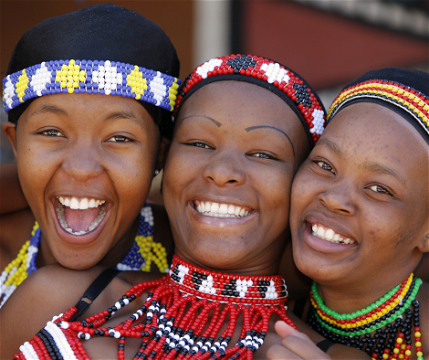Explore Table Mountain, Cape Town's iconic landmark and a UNESCO World Heritage site. Discover the history behind its unique flat-topped appearance and its status as one of the New7Wonders of Nature. Learn about the thrilling cable car rides offering panoramic views, and the adventurous hiking trails through diverse fynbos vegetation. Encounter Table Mountain's rich biodiversity, including the elusive Table Mountain ghost frog. Whether you're a nature enthusiast or a history buff, Table...
South African Slang everyone should know
South Africa is a fascinating country with a rich cultural heritage. It's amazing how diverse and vibrant the different cultures are, and there's so much to learn and explore. One of the best ways to connect with the locals is by learning some of the local greetings, like "Yebo" and "Sawubona." It's amazing how a simple greeting can open doors and make people feel more comfortable around you. Keep reading to find more than 20 slang words that everyone should know before visiting South Africa.
SOUTH AFRICAN SLANG EVERYONE SHOULD KNOW
Visiting South Africa? Learn a few words and phrases that South Africans use. We hope this list will help you navigate your way around and make your travels in South Africa more enjoyable and meaningful. So, don't be afraid to try out the local lingo!
Here are more than 20 commonly words and phrases:
Places:
"Joz"i is shorten name for Johannesburg
"Mzansi" = South Africa
"Mother City" - Cape Town
"PE"- Port Elizabeth
With 11 official languages in South Africa, you'll be surprised to hear that most people speak English.
Greetings that are commonly used:
"Molo" is the Xhosa word for "hello," commonly used in the Eastern Cape and Western Cape provinces.
"Howzit" is a casual greeting commonly used among friends in South Africa, particularly in the Western Cape.
"Sawubona" (sow-buona) - This word means "hello" and can be used to greet someone.
Goodbyes
"Hamba kahle" (ham-ba ka-leh) - This is a Zulu phrase that means "go well." It's a polite way to say goodbye.
"Robala ka khutso" (ro-ba-la ka ku-tso) - This is a Sesotho phrase that means "sleep well." It's a standard way to say goodbye.
"Siyabonga" (see-ya-boh-ngah) - This is a Zulu word that means "thank you." It's a polite way to show gratitude.
Expressive Slang
"Ke sha'p" is used to say I'm good or OK
"Yebo" (yeh-bow) - This is a Zulu word that means "yes." It's a typical response when someone asks you a question.
"Eish" is an expression of surprise or frustration commonly used across all South African languages.
Yoh!/Tjoh is used for a reaction when you are surprised or in shock
"Lekker" (leh-kuh) - This Afrikaans word means "good" or "great." It's often used to describe something enjoyable.
"Phone me" is commonly used instead of "call me" or "give me a ring"
"Ag man": Oh man, with more than a hint of frustration, irritation or annoyance
"Ag shame": used as a word for pity or sympathy, but it can also be used to indicate cuteness.
"Arvie": Afternoon, e.g., We’ll pop round for tea sometime this arvie.
"Ja" – yah: Yes
"Jislaaik" – yis-like: Exclamation of wonder or surprise
"Now now": or "Just now" it means sometime soon, within the next 30 to 60 minutes.
Slang words that South African use for transportion:
"Robot" - In South Africa, a "robot" refers to a traffic light.
"Circle" – is a roundabout
"Boot" is what we call the trunk of a car
"Bakkie" is what South Africans call a pickup truck
South African slang words for foods:
"Chow" - to eat food
"Padkos" : Snacks for a road trip.
"Braai" is the South African version of a barbeque and is a social event that brings people together over food and drinks.
"Amasi" (ah-muh-see) is a sour milk popular in South Africa. It's often served with pap (porridge) and is a staple food in many parts of the country.
"Borewors" is South Africas traditional sausage
"Biltong" (bill-tong) is a dried meat similar to beef jerky. It's a popular snack in South Africa and can be found in most grocery stores and markets.
"Slap Chips" are deep-fried potato chips
"Naarjie' – satsuma mandarin
"Cool or cold drink" is a soda
"Granadilla" – passion fruit
"Bringel" – eggplant (also used in India)
"Pooitjie [kos"] – a stew cooked on a three-footed iron pot
'Sap" – fruit juice
"Pap en wors" is a maize polenta dish and local sausage
"Vetkoek" – fet-cook: Deep-fried ball of dough that is excellent filled with syrup or mince.
Here are some additional words and phrases in South African languages that you might find helpful:
Zulu:
"Sawubona" (sow-buona) - This word means "hello" and can be used to greet someone. The response to this greeting is "Yebo" (yeh-bow), which means "yes."
"Siyavuma" (see-ya-voo-ma) - This word means "we agree" or "we acknowledge." It's a polite way to respond to someone speaking to you.
"Hlala kahle" (hlala ka-leh) - This phrase means "stay well" or "be well." It's a standard way to say goodbye.
Afrikaans:
"Goeie dag" (goh-ee deh) - This phrase means "good day" and can be used as a greeting.
"Tot siens" (tote-see-ens) - This phrase means "goodbye."
"Lekker slaap" (leh-kuh slaap) - This phrase means "sleep well" and is a common way to say goodbye.
Xhosa:
"Molo" (moh-loh) - This word means "hello" and can be used to greet someone.
"Enkosi" (en-koh-see) - This word means "thank you" and is a polite way to show gratitude.
"Hamba kakuhle" (ham-ba ka-koo-leh) - This phrase means "go well" and is a polite way to say goodbye.
Ndebele:
"Sawubona" (sow-buona) - This word means "hello" and can be used to greet someone.
"Ngikhona" (ngi-khona) - This phrase means "I am here" and can be used to respond to someone who is asking if you are present.
Tswana:
"Dumela" (du-meh-la) - This is a greeting in the Tswana language.
"Ke a leboga" (keh ah leh-boh-gah) - This phrase means "thank you" and is a polite way to show gratitude.
We hope this guide has been useful to you. If you’d like to suggest something to add to this list, drop us a comment below!
Click here to read more about South Africas rich culinary with these inquire dishes and snack...
Further Reading
Discover Cape Town, the Mother City of South Africa, through our ultimate guide. From iconic attractions like Table Mountain and the Cape Peninsula to thrilling adventures such as shark cage diving and hot air ballooning, immerse yourself in the city's rich cultural tapestry with dining tips, family-friendly activities, and practical travel advice. Whether you're planning your first trip or looking to enhance your experience, our guide ensures you make the most of...
Planning a trip to Cape Town? Explore a range of accommodation options from budget-friendly hostels and charming guest houses to luxurious hotels and unique boutique stays. Our comprehensive guide provides direct links to each establishment, making it easy to find the perfect place to stay in this vibrant South African city. Discover your ideal accommodation and make the most of your Cape Town experience with comfort and convenience.




Share This Post